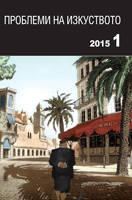Интерпретации на травматичността във филма на Ари Фолман „Валс с Башир“
Interpretations of traumatised memory in Ari Folman’s Waltz with Bashir
Author(s): Alexander StaykovSubject(s): History, Fine Arts / Performing Arts, Cultural history, Visual Arts, Political history, Film / Cinema / Cinematography
Published by: Институт за изследване на изкуствата, Българска академия на науките
Summary/Abstract: The paper interprets some of the main constructs of the message conveyed by Israeli director Ari Folman in his Waltz with Bashir. The subjects underling the storyline of the feature, are charged with enormous semantic strain. Seeking to metaphorically ease this strain, the author creates a multifarious and morphologically complicated work. The exploration is focused on just one of all the layers, i.e. on the interpretations of such a multifaceted phenomenon as traumatised personal and national memory. Using animation mixed in with documentary, the film presents the autoreflexive process of ‘archaeologising’ individual memory. Oblivion is a function equal in importance to remembering, but evoking the lost memories is a key to the rehabilitation of personal identity. Here the processes of recollecting are of paramount significance. Those devoid of their memories are devoid of their own past and in fact, of identity. And the entire reservoir of personal memory shapes collective memory. Principal points underscoring these interpretations in various theoretical contexts are defined in the article. Research tools of the fields of psychoanalysis, cultural anthropology, history and psychology are used for the purpose. Three keys to the subject terms are used: ‘memory’, ‘pain’ and ‘guilt’ for the needs of the illustrative stability of the text.
Journal: Проблеми на изкуството
- Issue Year: 2015
- Issue No: 1
- Page Range: 29-32
- Page Count: 4
- Language: Bulgarian
- Content File-PDF

